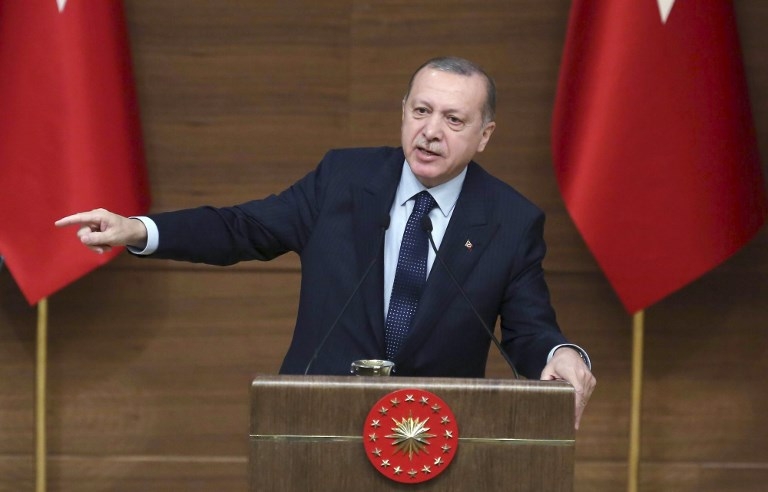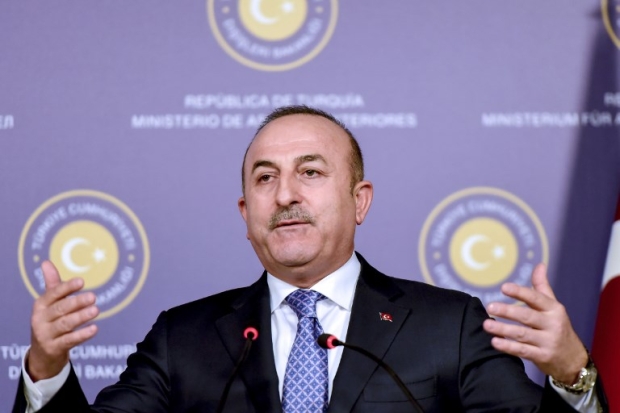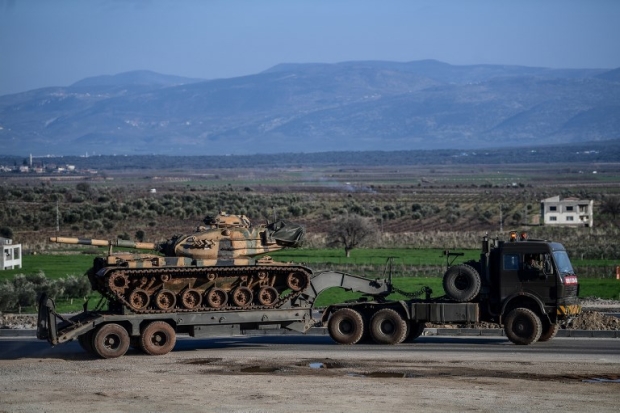ANALYSIS: Ankara tells US that deeds, not words, will restore ties

ISTANBUL, Turkey – Turkey’s foreign minister could not have been more blunt about his expectations from his US counterpart when he visits later this week – a bluntness arising not only out of deep frustration, but potentially from Ankara gaining the upper hand given the escalating risk of an Iran-Israel confrontation in Syria.
On Monday, Turkey’s top diplomat, Mevlut Cavusoglu, put aside diplomatic protocol and warned that ties between the two NATO allies would collapse if issues were not resolved soon.
“Ties will either be repaired or completely break down,” Cavusoglu said in televised remarks. “Restoring trust is up to the US. We want to see deeds; no more promises. And we will tell Tillerson this to his face.”
Turkey’s deputy prime minister was equally blunt.
“Don’t come to Turkey to convince us [to reconsider our Afrin offensive],” Bekir Bozdag told US officials while addressing a meeting of the youth wing of Turkey’s ruling party. “Instead, go and collect the weapons you have given to terrorists that you trained and equipped. And tell them not to conduct terrorist operations against Turkey.”
Bozdag’s remarks on Sunday came in the middle of a visit by HR McMaster, national security advisor to US President Donald Trump, to Istanbul.
McMaster’s visit was the first of a spate of meetings that will also see US secretary of state, Rex Tillerson visit Turkey on Thursday and US secretary of defence, James Mattis, meet his Turkish counterpart on the sidelines of a NATO meeting in Brussels this week.
The intensity of remarks by Turkish officials is largely prompted by anger at what it calls hollow US promises and support for a group it considers to be terrorist and a direct threat to Turkey’s security.
Iran-Israel clash and Turkey as kingmaker
However, different calculations could arise after the weekend downing of an Israeli fighter jet as it bombed what it called Iranian interests in Syria raises the spectre of intensified clashes between Iran and Israel either directly or via proxies.
Turkey’s position in such a conflict, with likely US involvement in Israel’s favour, could prove crucial. Both Washington and Tehran will want Ankara in their camp. And will lead both to make concessions to Turkey in Syria.
Nursin Guney, dean at Bahcesehir Cyprus University, told Middle East Eye the added dimension of an Iran-Israel confrontation in Syria could definitely strengthen Turkey’s hand but would add more complexity to an already complex situation.
“We have a mini world war unfolding in Syria and everyone is looking for allies. So, yes, an Iranian-Israeli conflict in Syria means Turkey will be in a stronger position. At the very least Iran will have to shift its focus to Hezbollah and that front. It will also have to stop criticising Turkey’s Afrin operation,” said Guney.
The Iranians wasted little time in threatening the US, saying all American bases in the region are within Tehran’s range.
We have a mini world war unfolding in Syria and everyone is looking for allies. So, yes, an Iranian-Israeli conflict in Syria means Turkey will be in a stronger position.
- Nursin Guney, Bahcesehir Cyprus University
Turkey’s shared border with Iran, its hosting of a section of NATO’s early missile warning system and Turkey’s power to allow or deny the use of Incirlik airbase - regionally vital for the US - ensures that all sides would need the Ankara government on their side.
Russia, which maintains good ties with both Israel and Iran, has kept largely silent, according to Guney.
Mikail Bogdanov, Russian deputy foreign minister, was reported on Monday as calling for another meeting of the Astana group, which includes Russia, Turkey and Iran. He also reportedly warned against escalating tensions as a result of Israeli airstrikes in Syria.
Hakki Uygur, deputy director at the Ankara-based Iran Research Centre IRAM, told MEE that Turkey would likely get what it wants from all sides in case of an Iran-US/Israeli standoff in Syria.
“Turkey will become a key determiner in such a conflict. Both sides will make concessions to get Turkey on their side. This means Ankara will suddenly find no opposition while trying to prevent the formation of a Syrian-Kurdish controlled corridor south of its border with Syria,” said Uygur.
‘National security only concern’
An official from Turkey’s foreign ministry, however, told MEE that Cavusoglu’s remarks were based purely on the disappointment at a supposed ally’s actions that jeopardised Turkey’s national security.
“The minister’s remarks are purely about Syria and how our supposed ally is arming the terrorist PKK/PYD/YPG and putting our national security at risk. This has long stopped being acceptable and he will tell this to Tillerson,” said the official, who spoke anonymously since he was not authorised to discuss the issue with the media.
The official said Ankara was not looking to gain from other parties clashing in Syria.
We want the conflict there to end and for our borders to be safe. Keeping our border safe is our priority. We are not happy with what the Iranians are doing in Syria either and have told them so directly
- Turkish FM official
“We want the conflict there to end and for our borders to be safe. Keeping our border safe is our priority. We are not happy with what the Iranians are doing in Syria either and have told them so directly,” the official said.
Latest figures from the Turkish military said 31 soldiers were killed in the Afrin offensive called Olive Branch to date.
Ankara has slammed the arming of the YPG by the US administration in particular.
Many in Turkey view Olive Branch as the start of a war against the US itself. Plans were announced on Monday to rename the street on which the US embassy is located in Ankara to Olive Branch.
Turkey and the United States have had a rocky relationship for a few years now with multiple issues creating marring ties. However, Turkey’s second military incursion into northern Syria and differences over the role of a Syrian-Kurdish militia group has made the risk of military confrontation between the two a real possibility.
Turkish officials have sworn that the offensive against the Syrian-Kurdish PYD/YPG militia will not be limited to the Afrin region and will eventually proceed to the town of Manbij, where US troops are active alongside their YPG partners.
Turkey sees the PYD/YPG as the Syrian extension of its own PKK, with which it has been in armed conflict since 1984 and lists as terrorist. The US and the European Union also list the PKK as a terrorist group.
The US, however, considers the Syrian Democratic Forces, mostly comprised of YPG fighters, as its most effective ground force against IS.
The US has infuriated Ankara by failing to keep its promise of ensuring YPG forces withdrew to the east of the Euphrates river after routing Islamic State group militants from the town.
The joint press statement released on Sunday after McMaster met with Turkish presidential spokesman, Ibrahim Kalin, was further indication of a lack of progress in resolving differences between the two sides over the YPG.
The statement only said “they exchanged views on American-Turkish relations as long-standing allies… and explored ways to expand the joint fight against all forms of terrorism”.
“That looks like an empty statement. I doubt anything substantial came out of that meeting,” she said. “The US is still just trying to distract Turkey with vague promises but Ankara will not accept that in a post-Afrin offensive world.”
Middle East Eye propose une couverture et une analyse indépendantes et incomparables du Moyen-Orient, de l’Afrique du Nord et d’autres régions du monde. Pour en savoir plus sur la reprise de ce contenu et les frais qui s’appliquent, veuillez remplir ce formulaire [en anglais]. Pour en savoir plus sur MEE, cliquez ici [en anglais].






